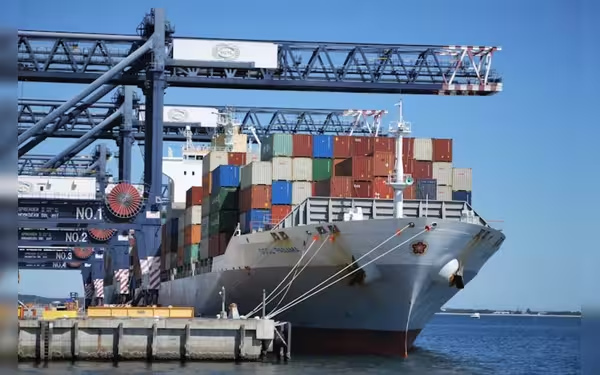Saturday, November 16, 2024 07:43 PM
Australia-China Trade Relations: Resumption of Rock Lobster Exports
- Australia resumes rock lobster exports to China after trade barriers.
- China gradually lifts restrictions on Australian products since 2020.
- Future of trade relations remains uncertain amid geopolitical tensions.
 Image Credits: asiatimes
Image Credits: asiatimesAustralia resumes rock lobster exports to China, but future trade relations remain uncertain amid geopolitical tensions.
In a significant development for international trade, Australia’s rock lobster industry is set to resume exports to China after a deal was reached during the ASEAN summit in Laos last week. This agreement marks the end of a challenging period in Australia-China trade relations, which had been strained since 2020 due to various trade barriers imposed by China. The resumption of rock lobster exports is particularly noteworthy as it was one of the last major restrictions still in place, following the imposition of tariffs on this popular seafood.
For many, the prospect of Chinese diners enjoying Australia’s high-quality crustaceans while Australians indulge in their Christmas roast turkeys is a cause for celebration. However, it is essential to approach this development with caution. The underlying dynamics of international relations mean that Australia’s trade situation remains precarious, heavily influenced by the broader relationship between Beijing and Washington.
Since 2020, the Albanese government has witnessed China gradually lifting export restrictions on several Australian products, including barley, wine, beef, and now lobster. This shift has occurred without Australia conceding much in return, raising questions about the sustainability of this newfound cooperation. While Australia did suspend two cases it had brought against China at the World Trade Organization regarding barley and wine duties, these cases can be reopened if China decides to revert to its previous stance.
Moreover, the Albanese government’s decision not to oppose China’s bid to join the Comprehensive and Progressive Agreement for Trans-Pacific Partnership, a significant regional free trade agreement, reflects a delicate balancing act. While Australia has not outright endorsed China’s membership, it has also refrained from taking a strong stand against it. This nuanced approach indicates a desire to maintain a working relationship with China while safeguarding Australia’s interests.
Reflecting on the past, it is evident that the relationship between Australia and China has evolved since the infamous “14 grievances” document was leaked in 2020. This document publicly criticized Australia on various fronts, including foreign investment decisions and alleged interference in China’s internal matters. The current thaw in relations suggests a willingness on both sides to move forward, but the question remains: how stable is this truce?
While the resumption of rock lobster exports to China is a positive step for Australia’s economy, it is crucial to remain vigilant. The complexities of international trade and diplomacy mean that this truce may not last indefinitely. As global dynamics shift, Australia must navigate its relationship with China carefully, ensuring that it does not become overly reliant on a partnership that could change at any moment. The future of Australia-China trade relations will depend on continued dialogue and mutual respect, as both nations seek to find common ground in an ever-evolving geopolitical landscape.












